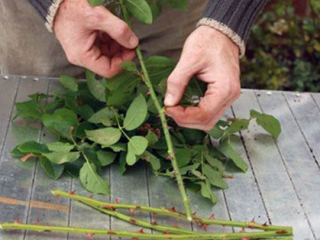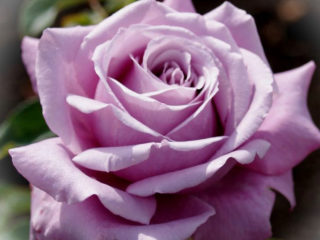Content
Roses are magnificent garden flowers, decorating the site throughout the warm season with their large, fragrant buds. Every housewife has her favorite varieties that she would like to increase in quantity and plant around the site. Propagation of roses by cuttings in potatoes is a fairly common technology that significantly increases the survival rate of planting material. Methods for growing roses in potatoes are simple and accessible. The technique does not require special skills and is suitable even for inexperienced gardeners.
Advantages and disadvantages of rooting roses in potatoes
Many novice flower growers have a logical question: why use such an intricate method of growing roses, because you can root cut cuttings directly in nutrient soil or in a glass of water.
The thing is that cuttings do not immediately produce roots. And during this period they need increased nutrition and stable humidity.The stem segments planted in the ground do not have enough moisture, they begin to dry out and die. And in the water, fastidious roses do not have enough oxygen, which also leads to a large percentage of dead sprouts.
Through trial and error, flower growers found the best option for growing roses at home - planting them in potatoes. Tubers saturate the cuttings with moisture in the right amount, provide vital nutrients, and accelerate the formation of roots. The advantages of this method of growing roses:
- You can grow a rose in potatoes either from a bush of your favorite variety or from a gifted flower.
- Cuttings allow you to obtain a copy of the mother plant with all the characteristics, in contrast to attempts at propagation by seeds. In addition, unscrupulous distributors may sell ungrafted seedlings, from which wild rose hips subsequently grow.
- The growing technology is extremely simple and effective, the survival rate of the material is more than 70%.
- There is no need to worry about nutrition and frequent watering of the sprouts after planting, they are already provided with everything they need.
- Starch, contained in potatoes in large quantities, promotes rooting and full development of the young plant.
- Potatoes are a kind of shield against unfavorable external factors for delicate plants - frosts, fungal infections.
This growing technology also has its disadvantages:
- not all varieties of roses are suitable for growing in potatoes;
- if you plan to plant outdoors, you must carefully select a site; it must be protected from bad weather, hot sun and excess rainwater;
- When planted in open ground, some of the rooted shoots may die.
Which roses are suitable for cuttings
Not all roses are suitable for propagation by cuttings. To successfully plant a rose from a bouquet or cut from a bush in potatoes, you need to take into account a number of nuances:
- Climbing and groundcover varieties of roses are not suitable for cuttings;
- you need to use only strong stems with living buds and leaves, the thickness of which exceeds 0.5 cm;
- cuttings from stems with ripe buds and blossoming flowers take root very difficult, so it is better to choose shoots that have not yet bloomed;
- The largest percentage of rooted sprouts are produced by mature stems with easily broken off thorns.
It must be remembered that sluggish, dried out shoots affected by fungus are unsuitable for propagation and cultivation.
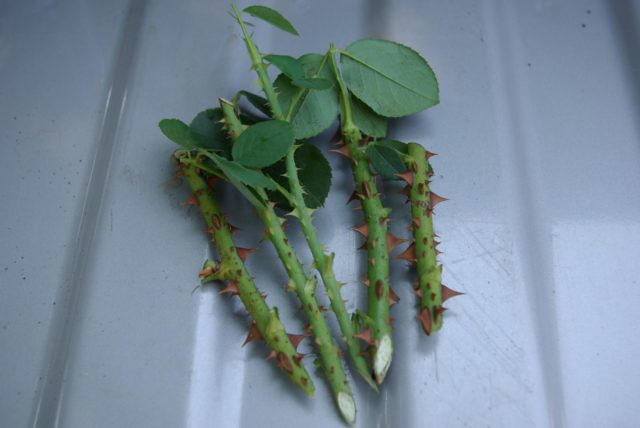
Roses with straight stems that are not affected by pests or diseases are suitable for cuttings.
When is the best time to root a rose?
To propagate roses from cuttings in a potato tuber, experienced gardeners choose the spring months, depending on climatic conditions. It is necessary to catch the period when the leaves have begun to grow, but the flower buds have not yet appeared or have just hatched. Cuttings from such a bush are the strongest and take root better.
If necessary, you can use this growing technology throughout the warm season. But at the same time, one should take into account the need to root young seedlings before the onset of cold weather.After the end of June, cuttings are rarely carried out, when planting for the winter in heated rooms or greenhouses.
How to properly plant a rose in a potato at home
Growing roses in potatoes at home is a very interesting process that does not require special materials or skills. But you should carefully follow the established rules. Any violation of the technique is fraught with the death of valuable planting material.
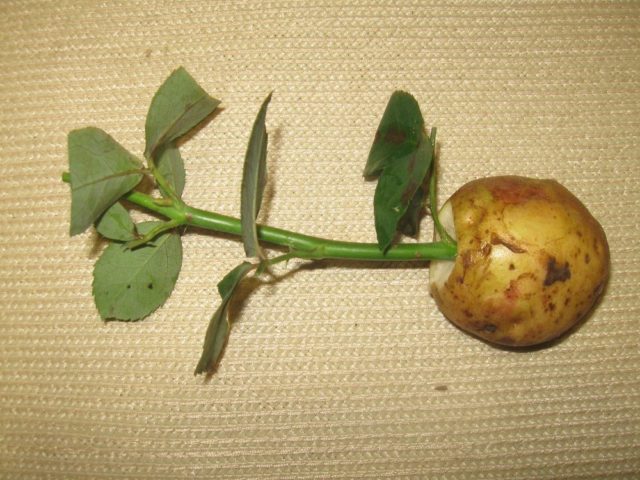
You will need a rose cutting, a potato tuber and some free time
Preparing potato tubers
When choosing potatoes for rooting sprouts, you must adhere to the following criteria:
- it is advisable to use fresh, just dug tubers from your own plot, not saturated with dangerous chemicals;
- the diameter of the potatoes must be at least 8 cm;
- We need whole, healthy specimens, free from rot, stains, fungal and bacterial infections.
The tubers must be cleared of soil and all eyes removed with a sharp knife. The procedure is carried out so that the potatoes do not sprout during the process. Then you need to make a hole in it, slightly wider than the base of the cutting, deepening it to approximately the middle of the tuber.
Preparing the cuttings
You can grow a rose cut from a living bush in potatoes, or use a fresh stem from a purchased bouquet. You will need a sharp knife or pruning shears to ensure perfectly even cuts. If the shoots are long and strong, they can be cut into several parts. The length of the cuttings should be at least 15 cm, and the number of living buds should be from 3-4 pieces. Then they should be prepared for planting:
- make a strictly horizontal cut located 5 mm above the uppermost bud;
- the lower cut is made at an angle of 45 degrees, 1 cm away from the last bud;
- it is necessary to remove all leaves to reduce moisture evaporation;
- optionally, break off all the thorns;
- dilute a slightly pink solution of manganese and immerse the planting material in it for several hours;
- You can treat the lower cut with Kornevin diluted according to the instructions or a similar preparation for better rooting.
After this, the planting material is ready for use.
Planting a rose in a potato tuber
Having finished the preparations, you can proceed to the most important stage: rooting a rose from a cutting in a potato. To do this, the planting material is inserted into the tubers with an obliquely cut end. After this, they are placed in containers with fertile soil mixture. Or they are planted directly on a prepared site, located on the south side, in partial shade, protected from strong winds.
The bed must be dug well to a depth of 20 cm, humus, peat, and ash must be added. If the soil is too heavy, add sand. Moisturize. Plant potatoes with cuttings at a distance of 20 cm, no deeper than 5 cm. Sprinkle the top with peat, garden soil or black soil.
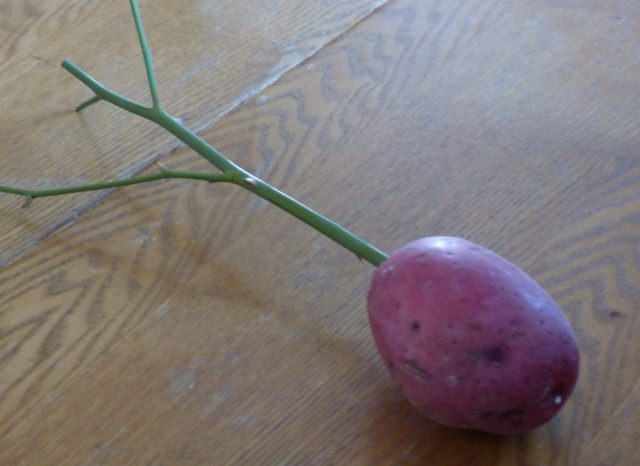
Potatoes for planting cuttings can be taken from various varieties, which are available
Aftercare
Rooting rose cuttings in potatoes will be successful if you provide the delicate sprouts with proper care:
- cover with glass jars, film, plastic bottles to ensure a favorable microclimate;
- Water moderately so that the soil remains slightly moist, but not soggy;
- after 5 days of planting, pour in a sugar solution - 40 g per 200 ml of water;
- provide young shoots with sufficient lighting and protection from direct sunlight.
As soon as the rose cuttings have taken root and new side shoots have appeared, the shelter can be gradually removed, extending the period daily, adapting the seedlings to the open air.
To transplant a rooted sprout to a permanent place, you need to carefully dig it up and remove the remaining potatoes without damaging the roots. Plant in prepared fertile soil. The depth of the holes is 7-10 cm. Sprinkle with soil and mulch. By winter, young seedlings must be covered with coniferous paws, leaves, and straw.
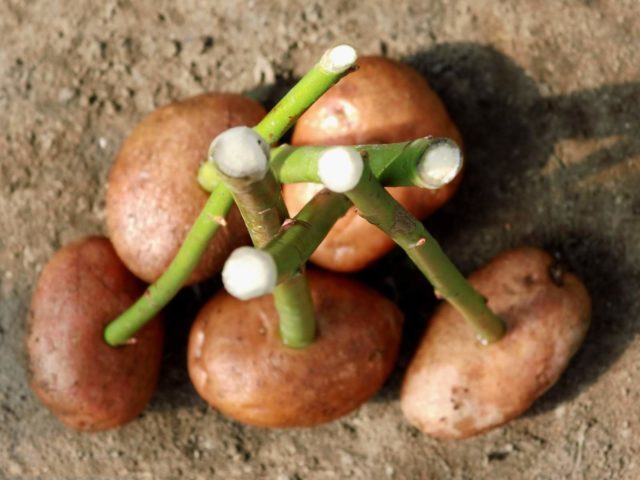
Experienced gardeners plant rose cuttings in potatoes directly into open ground
How to plant a rose in potatoes with honey
An excellent effect is achieved by germinating rose cuttings in potatoes with pre-treatment in a solution of a natural biostimulant. Natural honey in the amount of 30 g must be diluted in 1 glass of water at room temperature. Immerse the cuttings in the solution for half an hour. Then plant the roses in the potatoes in accordance with the standard procedure: cut the end to the middle of the tuber. Then place them in a container with soil and cover with film, glass or plastic bottles.

Honey is an excellent natural antiseptic that prevents the growth of pathogenic microflora and promotes the development of seedlings
Recommendations
Experienced gardeners have their own secrets that allow them to successfully cut roses in potatoes:
- you can add a teaspoon of aloe juice to the potassium permanganate solution in which the cuttings are processed;
- to make a hole in the tuber, you can take a thick nail or screwdriver;
- The cuttings should be inserted into the potatoes carefully so as not to damage them;
- the optimal temperature for rose seedlings is 25 degrees, air humidity is normal;
- You should not “flood” the plantings - roses cannot tolerate waterlogging and begin to get sick.
Cuttings grown at home or in a greenhouse must be accustomed to the open air. To do this, containers with seedlings need to be taken outside, increasing the time spent gradually. With the right approach, the cuttings are finally ready for transplanting into open ground after 60 days.
Conclusion
Methods for growing roses in potatoes were invented not so long ago, but have already gained well-deserved popularity among gardeners. This is a simple and effective technology that allows you to grow full-fledged seedlings from a single cut stem or propagate your favorite variety. In order for cuttings to take root in potatoes, you must adhere to planting rules and choose complete, healthy material. The technique does not require any special skill or special tools. Even novice summer residents can cope with the task.




